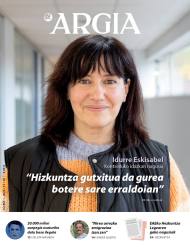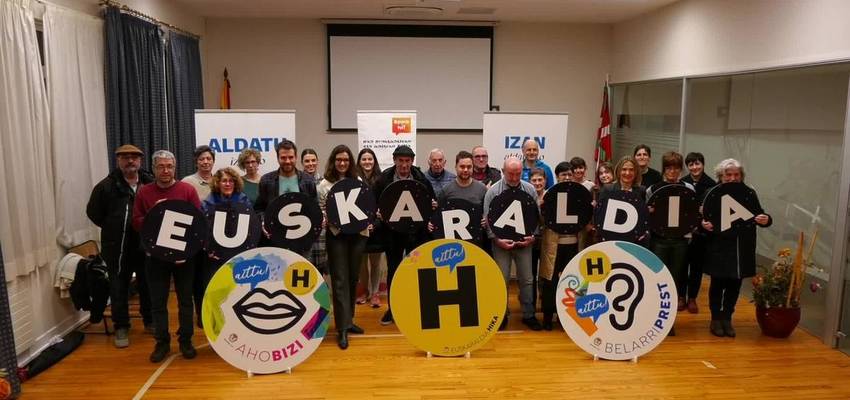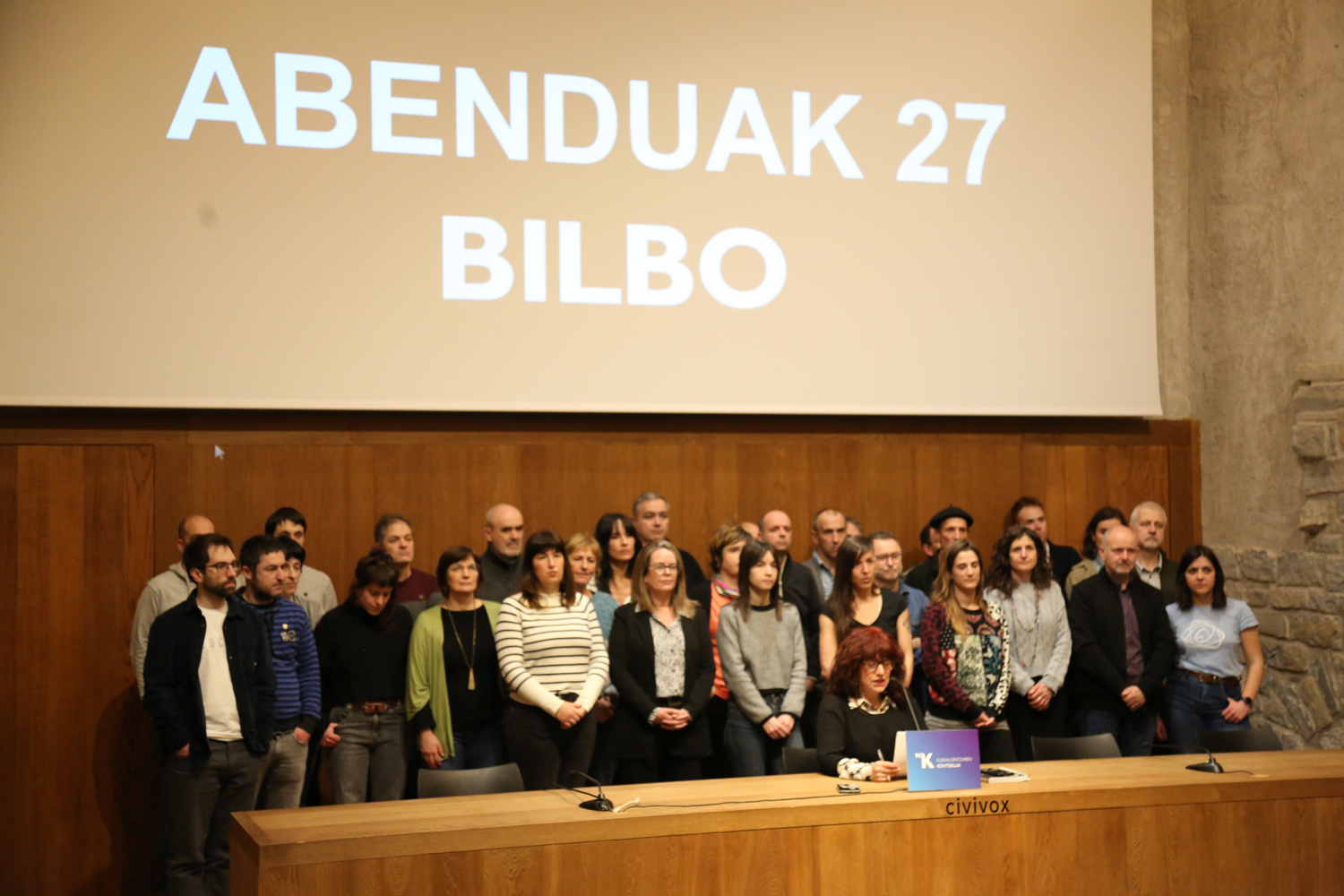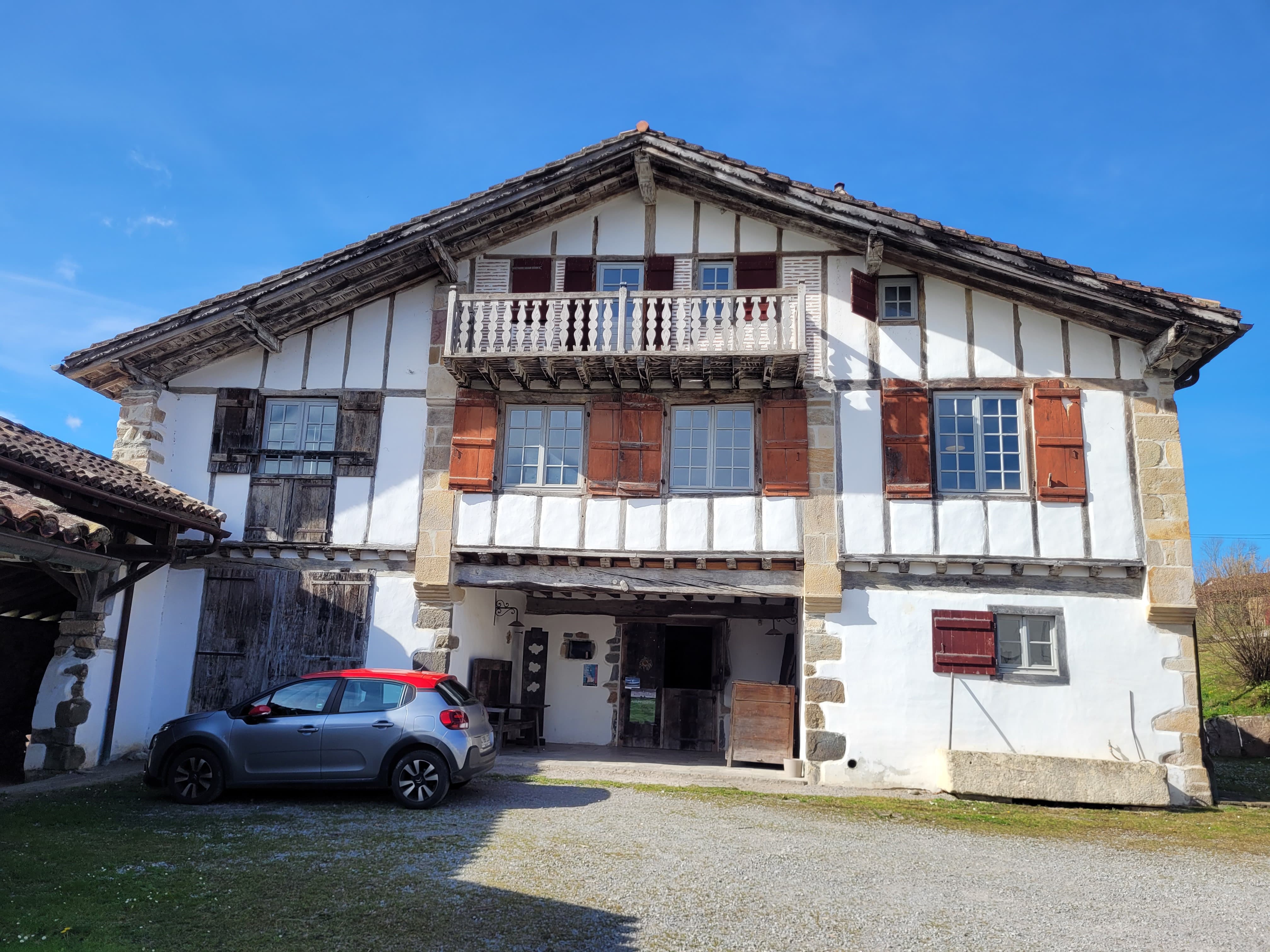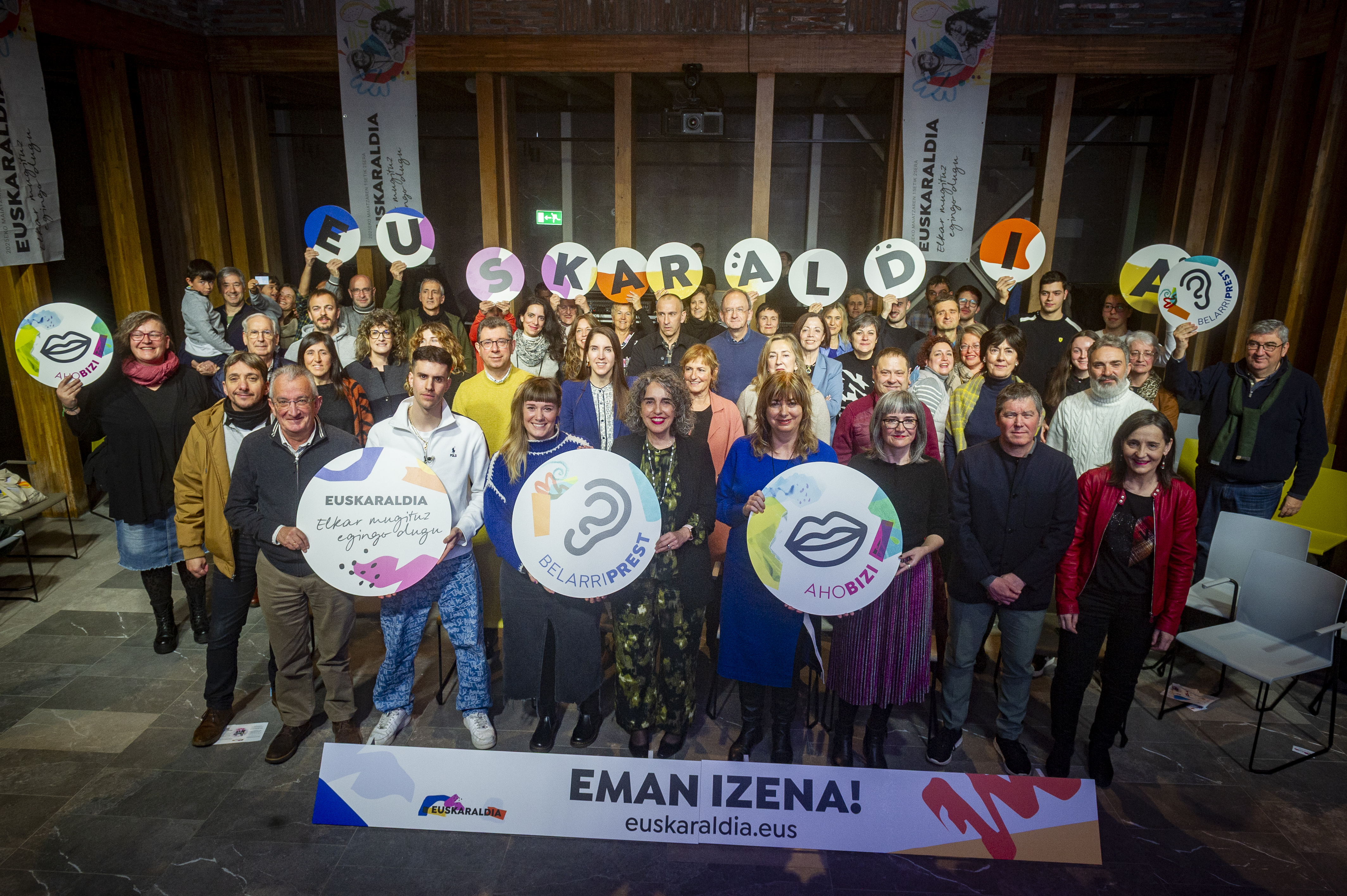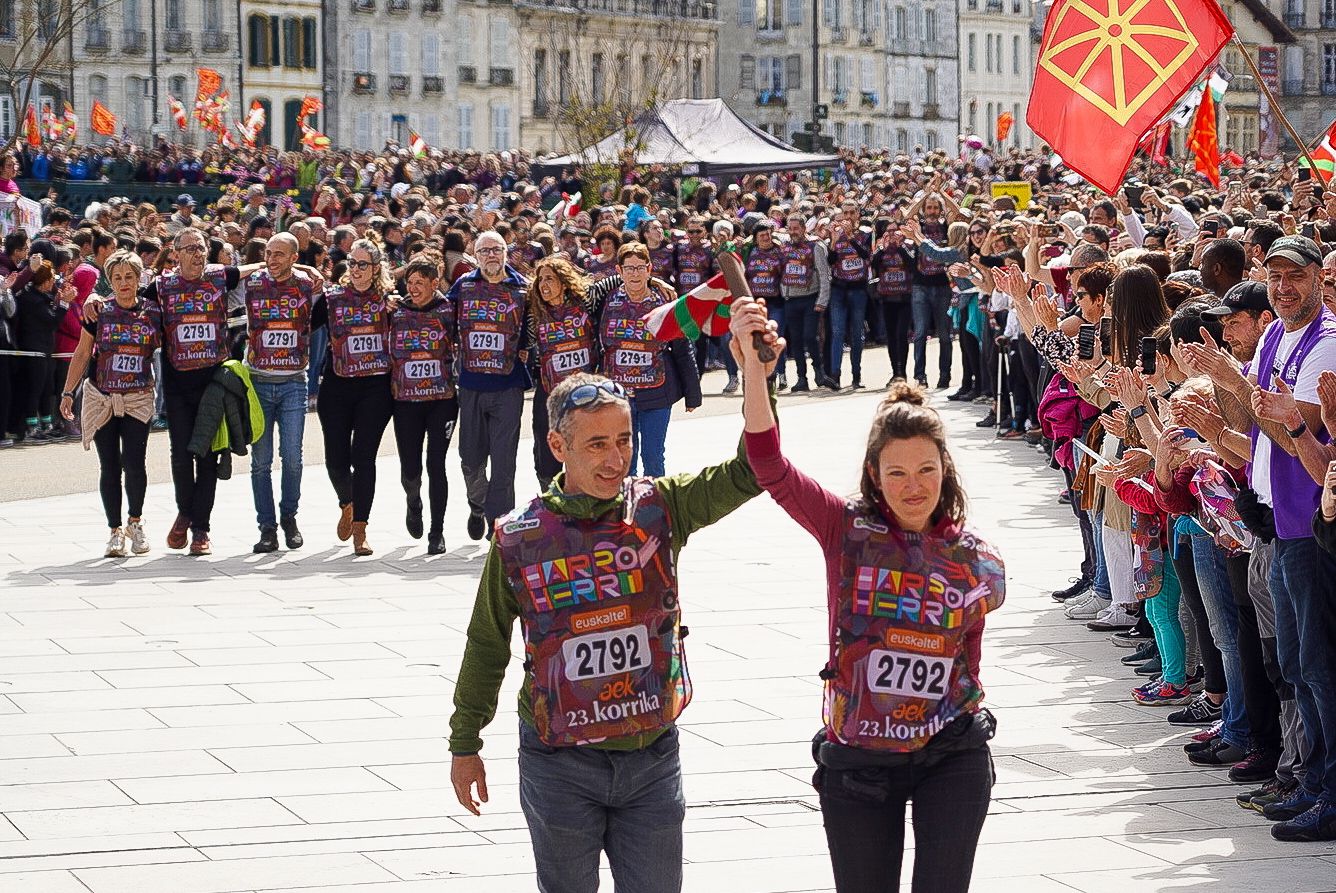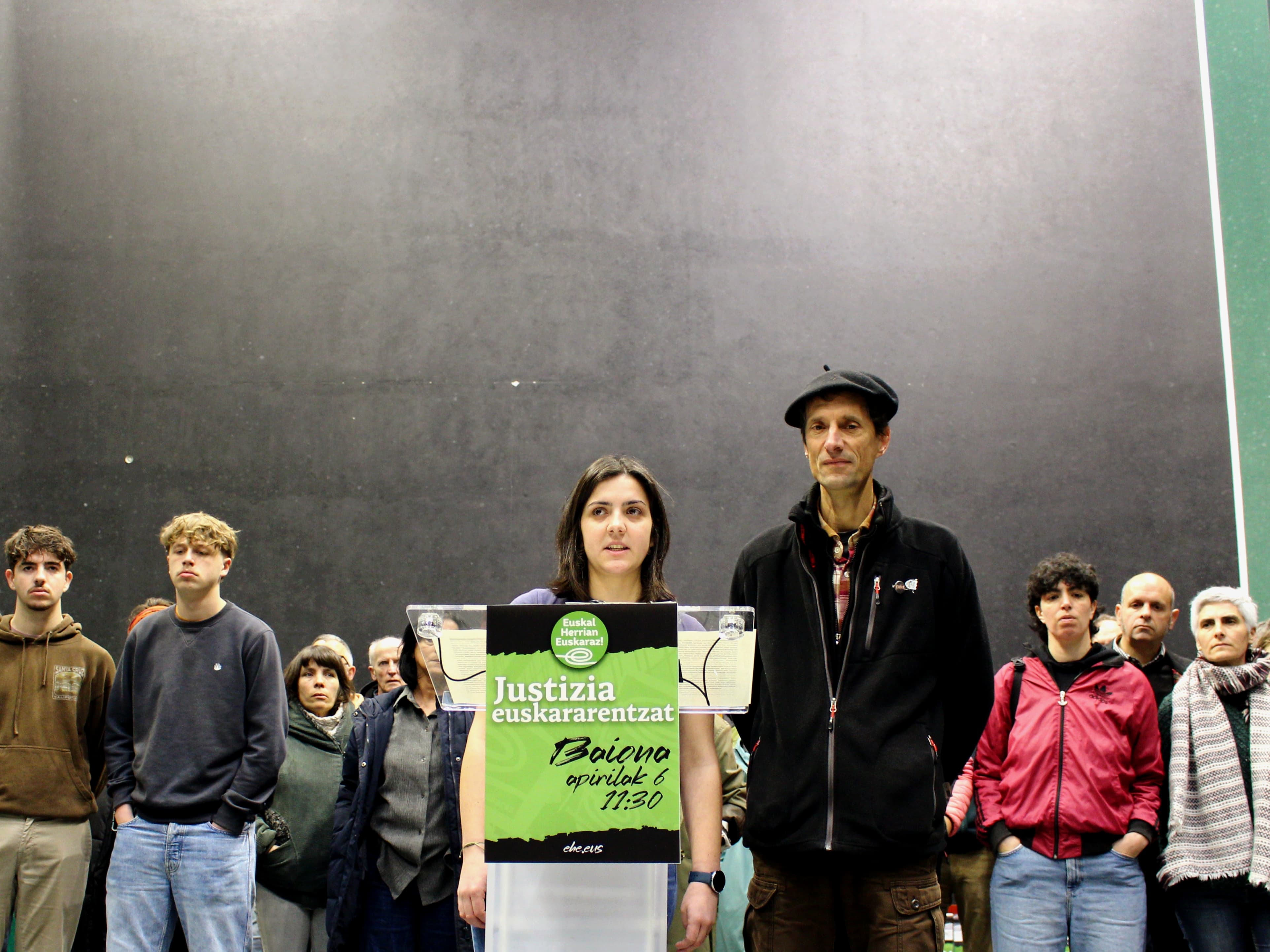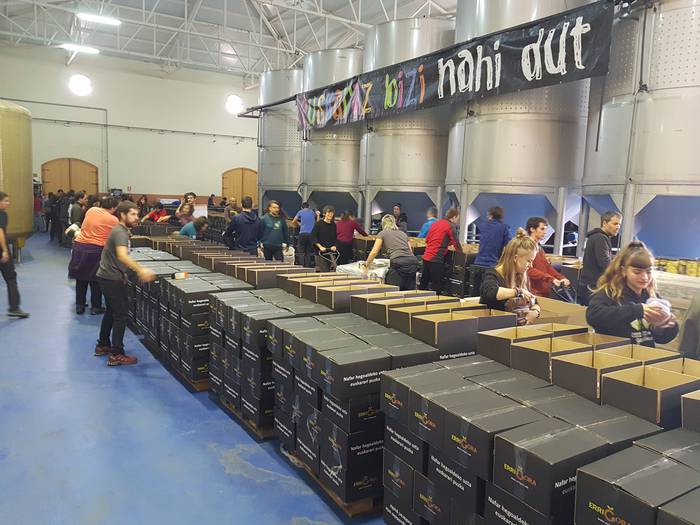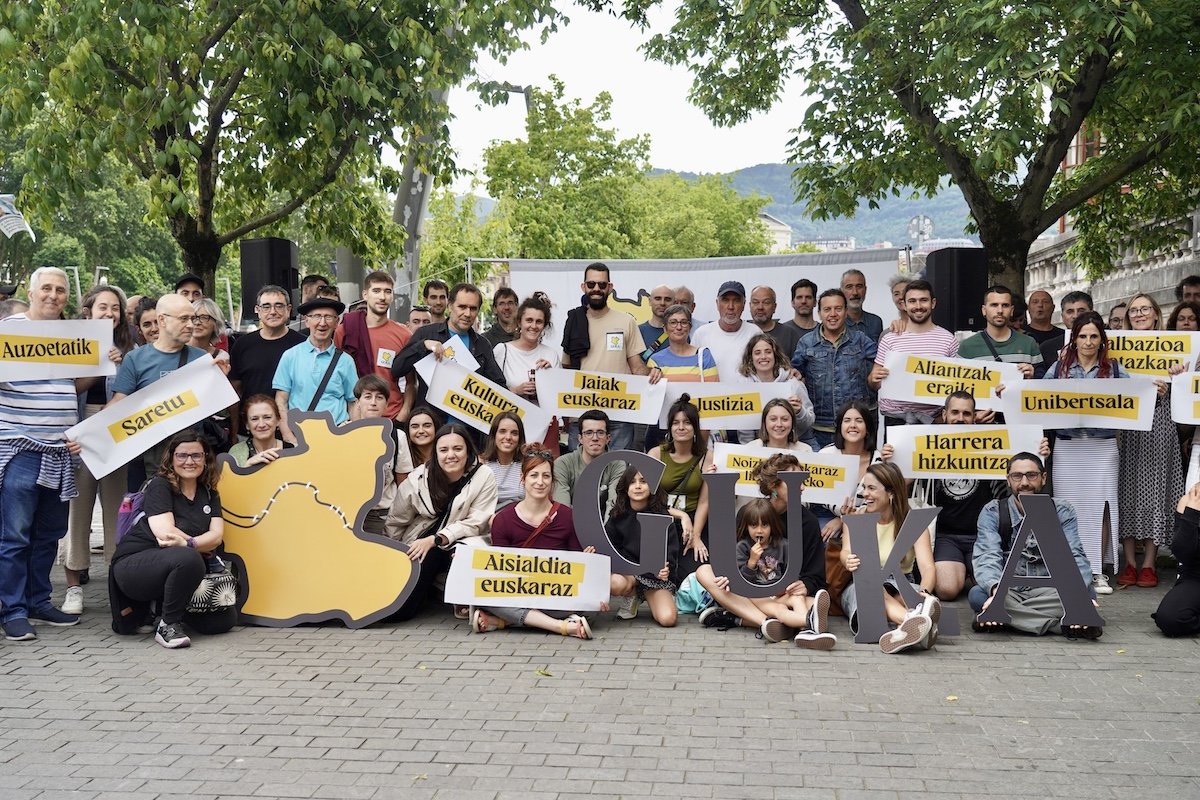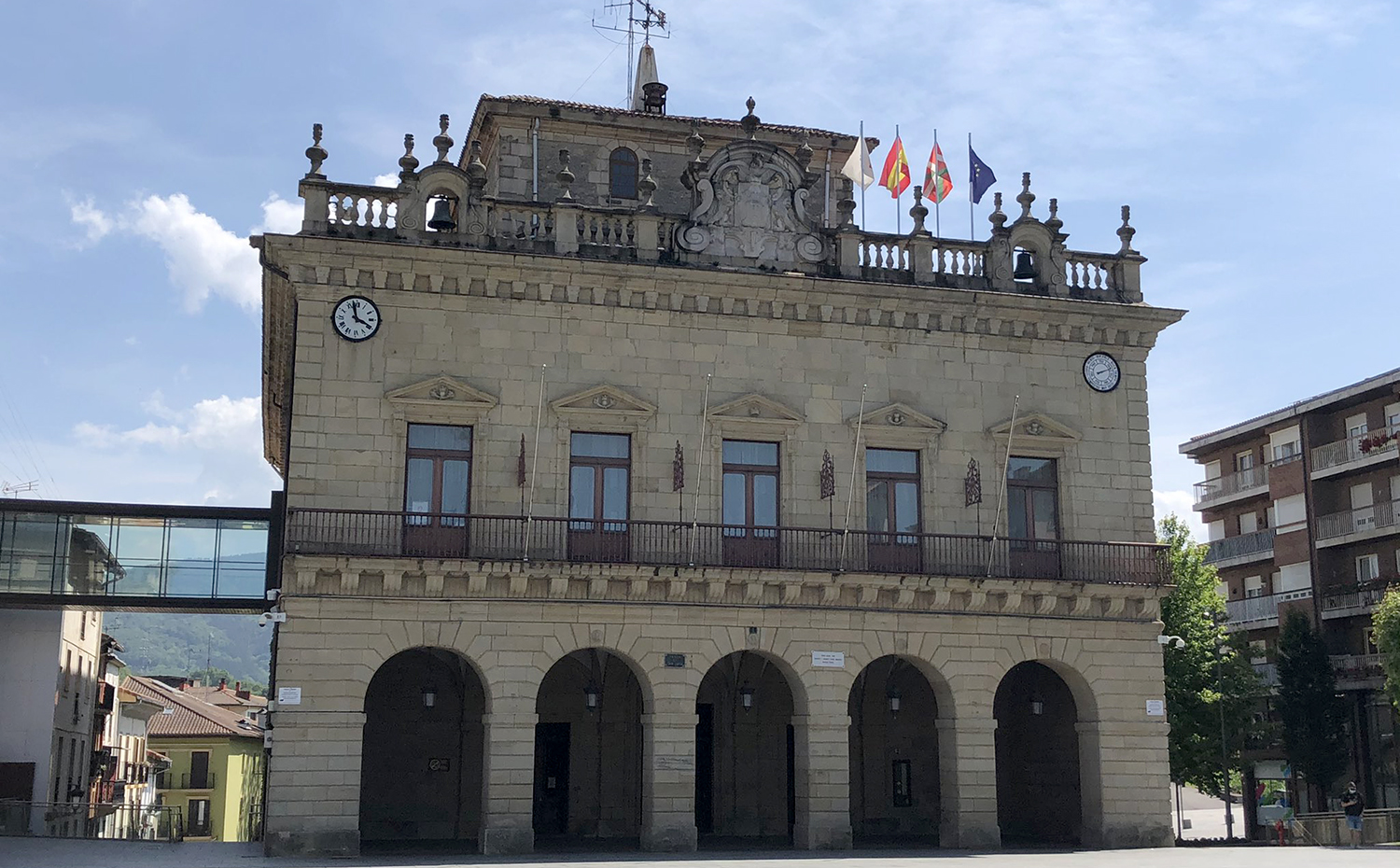"Without considering that Euskera is a minority language, we will hardly advance"
- Idurre Eskisabel Larrañaga is the new Secretary General of the Council of Euskalgintza (Beasain, 1970). Journalist, anthropologist and professor at the UPV. He was a Euskaldunon Egunkaria worker when the Civil Guard unjustly closed him. Goseak janak poesia Liburua and Trikua wakes up with written essays, the latter with Lorea Agirre. We believe that it will bring a new air to the movement for the revitalization of the Basque country, a struggle that we have found wanting to place ourselves in the field of social justice and contribute to moving from the survival of the Basque country to the revitalization of the language.

What mood did you worry about?
If I have nervousness and vertigo, those doubts that always come up to us about our capabilities, but I also think the mind has overcome that. I am concerned about the process of revitalizing Euskera. However, at this point in time to influence society, and not only in Euskal Herria, it seems to me that the linguistic question is a very interesting place. You have received a
lot of congratulatory messages on social media in the wake of the news. Can you tell if you have been called from an institution? Yes, I have received the message from the language policy of the Basque Government.
How does the Council see the work for 25 years? What would you highlight?
The same nature as the Council. In this space as diverse as the one we call Euskalgintza, multiple perspectives are concentrated. There is simply a dynamic of will and of doing to put the Basque country on the axis and work together above other differences, and therefore an organisation, I think it is important. On the other hand, 25 years give much and I associate the Council’s trajectory with that of the Basque country. The lights and shadows I can see in one of them are the ones I can generally see in the Basque industry. I would add that in recent years the Council is at an interesting time.
.jpg)
In the wake of the change of cycle required of Euskalgintza, you have claimed that the Basque industry is already immersed in a new era in the official inauguration ceremony held in Durango.
Yes, much has been said in recent years about the need for a new stage in the field of Basque culture, a new cycle, the transformation of the roundabout into eternal. But we came from the political cycle in every way. In Euskal Herria, the armed conflict has marked everything and that cycle changed with ETA’s decision to abandon and dissolve weapons. This has had its own butterfly effect in all policy areas, including in the revitalisation of the Basque Country, which I believe is a political issue. During the movement there has been great rethinking. Not only in the Basque Country, but also in the world, great changes are taking place, and it is quite objective to say that in the last two decades the speed of change is accelerating.
The processes of understanding and assimilation of the dynamics of the world are much faster, so the survival of a minority language such as ours and the experience of those who focus on a minority language has become a complex task. This is the phase of reflection in which Basque cultural activity, discourses and practices are reconsidered, and has already taken some directions: to increase social consensus, for example, with agents who place themselves outside the Basque sphere, raising the issue in terms of justice and social cohesion. Furthermore, the Council has launched the dynamic Batuz Aldatu and has proposed two pillars to go down the road: to universalize the knowledge of the Basque country and to create comfortable areas to live the lives of the Basques.
How do you read the latest sociolinguistic measurements, where usage is reduced over and over again?
I get more questions. One of the readings performed in this later cycle was that as knowledge expanded, use would increase. We're seeing no. Regarding the jump from knowledge to use, I consider essential the readings that relate Euskera with some functionalities and values. We must not forget that ours is a minority language situated in a gigantic network of powers, and that its use will actually be difficult, it will be a choice. And to do so, you need motives, whether functional (because you need them to work or face everyday life) or a symbolic value (which will influence you on emotions and character). In this sense, in relation to education, I find the reading of Iratxe Retoloz very interesting. Besides receiving the Basque language, students need a floor to use it. That soil will be provided by the cultural sphere, references in which it makes sense to choose that language. We have a great shortage in seeking and giving meaning to the Basque people in daily life. This does not come from individual impulses, because social dynamics are not born out of nothing; public policies must drive and encourage them.
How do you see language policies in this country? We can start from the north.
"The revitalization of the Basque Country is a process of social transformation"
I see hope, movement and diligence since institutionalisation is being achieved. Institutionalization has provided some support or minimal implementation of public policies. At the same time, however, we see that every time we move a little towards the official language, France is cutting it. The most beautiful example of this struggle is that students are claiming the right to tests in Basque. The students demand the tests!
From Navarra?
Slaughter is complex. Zoning is a great scourge, as it generates great injustice among the Navarros in accessing the Basque country. Navarre has been and is a state matter, and many of the policies that have been made in linguistic matters have been done there. For 40 years this field has been worked out and a great deal has gone back. Sometimes any small advance in favor of the Basque country is a great demand. And I see parties, even nationalists and Vascophiles, entangled in that pressure, way further behind what the Basque people wanted.
What about the CAPV?
It is the simplest state level and has been developed for 40 years regulations, laws and policies that can be driving forces in other areas. But the results we have mentioned before show us that it is not enough. Discourses and public policies are based on the idea of the official status of the Basque Country in the CAPV, since it is forgotten that, however, we are a minority language. If we do not take this into account in the equation, we will hardly make progress in promotion policies. Moreover, it is rarely mentioned that the process of revitalization of the Basque Country is a process of social transformation. That in the power relations of society there must be changes, as in any transformation process. Resistance always emerges and the key is in its management. In the model of making the policy we have, not ours alone, because this scourge is also widespread, partisan policies are made, thought out in the very short term and afraid to lose votes. There are no temples that demand processes such as the revitalization of the Basque country. Because we don't have to look at climate change or the energy crisis. There are issues that are big and basic, that require Politics to be done in capital letters, but because political play is as it is, there is no capacity to do so.
.jpg)
Is there no capacity or do the lords of the institutions not want to boost the social transformation you mention?
This can also happen, but it does not appear discursively. Moreover, I prefer to have hope in this regard.
The Council has considered it strategic to achieve the universalization of knowledge. How is it possible that the learning of the Basque language at the CAPV is not yet free?
It is not for me to respond and I will return to this, because it is difficult for us to implement sound policies that focus on the regeneration of the Basque country. Probably because they don't have immediate electoral returns.
He said that his goal will be to deepen alliances. On the one hand, with Basque cultural agents. How do you see the picture?
“At this moment I see a certain unity in the diagnosis of the situation”
Fortunately, it is very varied. I don't like very monolithic and homogeneous things. The previous political cycle, ETA’s armed activity, left a great mark at that time also on Basque cultural activity. In this respect, I would say that it is now easier to understand ourselves. At the moment I see a certain unity in the diagnosis of the situation and in the strategies I am putting forward, I do not see a huge divergence either. What is interesting and what I do not see so much is the arrival of a new generation – and the creation of the Euskaltzales Youth Network is very rewarding – would help break the generational inertia.
You also mentioned in these days your intention to deepen alliances with the institutions. Do you not think that the institutions with the collaboration they propose or with the “servitude” often neutralize social movements, especially when they start putting money? Do you see any danger to it?
This problem occurs in all areas, it is systemic. In addition, one of the disabilities of the movements that operate in the social transformation is that the slit system does so quickly. We have to think very well and I have no solution. It's something I'm concerned about: How can we influence social actors in what the system has the ability to take on everything? We don't want to change everything so we don't change anything, right? Furthermore, we must think that every small field that is won is important.
Paul Bilbao just said in Berria: “Political consensus needs content, we are not at the time of the photographs.”
Yes. Specific keys and deadlines must be taken. The law of public administration, for example, from the Council, we are making concrete proposals, and the Education Act must also be an approximation. Furthermore, consensus should be assessed periodically. That is what we need to do.
“Euskera should be the standard language of the educational system,” they have asked as an amendment to the Government’s Education Act, in a manifesto presented by 200 people. If the amendment is not accepted, do you see Basque cultural operators willing to conflict with the government?
“How can we influence social agents in what the system has the ability to take everything on?”
I have not yet had time to take that pulse with the agents, I have no concrete answer.
The Council has also identified as a working line the creation of spaces to live comfortably in Basque. Should the “standardisation” that had been used as a new formulation of the undetermined objective be considered?
Yes. Those of us who focus on Euskera are very aware of the linguistic stress. For example, in this last Euskararen Aldia one told me that he has chosen an ear to not face this stress. That is, instead of doing the exercise well, being uncomfortable and making the Basque see, he decided that others would do him in Basque. Because it's uncomfortable, language goes through the body. When I start in Euskera in places where I don't know that Euskera is guaranteed, whether it's a trade or a rock, I get the feeling of imposition. And it is something shared, it happens to most Basques, I would call it “the subalternos complex”. Life would be more stimulating if these dynamics were not produced. It is also time to exercise our rights. When we talk about any kind of concertation, for example when we go to the health system, we are obliged to speak in a language in which our voice is reduced or not so well developed. We propose comfort in the sense of habitability.
.jpg)
You attach importance to placing the Basque struggle within the framework of social justice.
Despite the great critical mass that exists in the transfer of the language from generation to generation, from society in general, this thing of the Basque Country is unfortunately something of a few. Basque Basque Account. If, in addition to the duration, revitalization is going to proceed, the pillars will be the universalization of the Basque Country and the vitality of the people we focus on in the Basque Country, it is not enough with the involvement of the Basque Country to create spaces of comfortable use. Others will also have to come, and to those others it must be said that language is not something confined to the corpus, which is about deepening coexistence, social justice and democracy.
Is the struggle for Euskera a way to fill in content?
“Being a member of a minority language gives us some advantage to work in community construction”
The feeling that we are becoming more and more uncomfortable in the world is very broad. If we asked people about the march of the world, we would get very apocalyptic answers. Part of this misdiagnosis comes from this enormous homogenization. This is where you discover this wild variant of capitalism. We find ourselves alone and arrested, and all people are looking to create community, intrude us, etc., it's not just in the Basque Country. Membership of a minority language gives us some advantage for Community practice. And I mentioned climate change and collapse before, and I'd like to add that the idea of linguistic ecology is important to the earth. Because languages, beyond their functional characteristics, are pillars in the formation of people, in the formation of communities. In addition, we have to make it clear that when it comes to asking for Euskera, we do not mean that you have to euskaldunify from day to day and focus your life on Euskera, the demand is not that. Defending the Basque is to understand all this, to understand that it is not just a linguistic question, that it has to do with justice and democracy, that it requires proactivity, that it be patient in the second place. Feminisms also propose the redistribution of powers when they draw their project. It is told to hegemonic white men: “Have patience and estate in the second line.” Perhaps being in favor of the Basque is to assume that patience with the Basques.
With the dynamic Batuz Aldatu you also want to turn non-Basque agents into active subjects. What agents have you brought together?
We are 113 agents of all kinds: from the foundation Athletic, through the Social Charter, to partnerships related to racism. The center and the edges play us both. It is mandatory to approach these edges. In this sense, Amelia Barquin has just published a very interesting article, in which the basic thing is that the Basque needs emigration or these new Basque citizens, with an overload of reasoning, with a load of rising also from the point of view of class.
He has spent the last few years working to unite feminism and vasquism. Do you see Basque cultural agents willing to transform themselves by taking steps into feminism?
Like all processes of social transformation, it goes slowly and finds resistance. It is true that, forced by the aforementioned cycle change, the Basque industry has had to review many of its things. For me, what we're seeing at the Bertsolaris National Championship is very interesting. On the one hand, there is a large group that sees the need for transformation, but at the beginning of the transformation finds resistance, often unconscious. I think it is extrapolable to the Basque industry in general. We are no better or worse than anyone, but we are in favour of rethinking or reinventing ourselves, because we are talking about dependency, and that new ideas enter more easily.
Is the struggle for Euskera built much of masculinity?
I have no clear answer. I would say that in the so-called respiratory areas of Euskera, the defense and activism of Euskera is built from a certain masculinity, which is uncomfortable for those who stay outside it. Look at Artetxe mentions in his thesis that if they closed their eyes and asked us how we would imagine the Basque there almost comes a Olentzero. Ha ha ha ha. However, there is also much to say. Basque activism and use are feminized. In all territories and in all age groups, except for older women, women use Basque more. To give one thing, many more women participate in Euskaraldia. And if we go to the cultural acts of Euskera, women are almost always much more. Women are also engaged in penetrating and pulling the transformation process. Also among social agents, the Basque one in a way, most practices related to coexistence and social justice take place in feminism. Has this plural feminist movement not worked more consciously than in other areas?
Do you see feminisms, therefore, assuming the struggle for the Basque?
Feminism is diverse and not everyone agrees on it, but I would say yes, and in addition, the sectors of the feminist movement that until recently have been away from the recovery of the Basque country and the linguistic question have also become aware in recent years of its social and transformative dimension. They're making their way.
Feminism plays an important political role in the empowerment of women. How do you see Basque cultural activity in this area? With just one day as an example, March 8 and December 3 are like black and white.
The difference is tangible at the moment. As Euskaltzales, we give ourselves much less legitimacy to claim, question, ask. It's a consequence of lack of muscle. At the same time, I said earlier that the creation of the Euskaltzales Youth Network was immense news, not only because another generation has been involved in the revitalization of the language, but because they see the process of revitalization linked to social transformation. Perhaps in recent years you have missed that. In the CAV, the official has brought, in addition to all the good, some burdens. In the idea of normalization, for example, we have become too immersed or have linked the Euskaldunization of some generations with a strong normativization of them as a mandate received from education and order.
As Secretary-General of the Council, in his first public act he fought against de-ologization: “The idea we have often mentioned and promoted is that the Basque country must be out of politics. I think we have to translate that idea and say that if Euskera needs something it is political, beyond the partisan, politics of high breath.”
"We have to think about Euskera politically, in the long term"
It is an idea that we have very much inserted, that has been repeated to us in many generations. I understand the starting point, in a way, is a strategy of self-protection of vasophiles, because we have been very barred. “We didn’t come to fight with anyone,” as we would say. However, we eliminate their great potential associated with consciousness. When I say politics, I am referring to a Politics with capital letters, which is going to be out of the gallop games of parties and which relates to the idea of feminism, because it has shown us that everything is political. You have to think about Euskera politically because it's so important, but in the long run.
The aggression against the Basques continues. Is it growing or is awareness of the problem what is growing?
I don't have any specific studies. I would say that in the Spanish State aggression from the judiciary has increased. Iñigo Urrutia spoke, on the one hand, of the permanent tendency of states, all leading to homogenization. Tolerate but not match. To do so, its guarantee is the judiciary, as is now seen with many things in Spain. All that has been created around the law, for example, reflects the resistance of machismo installed through the judiciary. In France, the attacks are also often carried out by the judiciary, such as the 'Molac' law.

Do we have naturalized that we speak second language?
As part of DNA. Before I told him that I myself feel imposing when I make Basque in a place where I have no guaranteed language. There I look and see complexes, I don't want to bother, etc. Over the centuries, the complexes we've lived have been emerging from generation to generation. And what happens to us on a personal level, on a collective level. I believe that there is the burden of subalternity and that this is what prevents us from seeing ourselves on an equal footing.
Euskera and Basque culture as the axis of the future! I would like to ask you about the first sentence of the manifesto. “The Basque language is the language of our people.” Is that not clear?
Sometimes not. In addition, we are often reproached for being essentialists. I see the subalternity factor behind the need to leave it clean. Why has Sorion made us so happy? Because we're constantly instead of explaining why we carry all these loads. We have to give ourselves a story, as all cultures, groups, countries do. But as we do from the subalternity, we are more pointed out and immediately become essentialists, we are told that we live looking at our navel. Wouldn't we be more comfortable living by going to Spanish or French and relating to ourselves and the world? However, this means that we are no longer ourselves for many speakers. And many times that doesn't look. In this sense, I liked a bird put by Hasier Arraiz: these lands here constitute the only territory of the Basque country.
The last question, Euskaraldia, has just ended. What do you think of this initiative?
In principle, it seemed to me a great initiative. It also comes from feminist theory, because there is or may be a direct interpellation: I cannot speak in Basque, because you do not leave me, which confronts me, therefore, be patient and have an ear. That is interesting. But when you take these campaigns to the context of thousands of people, if after the first exercise is not treated properly, they're not enough. We need permanent effective work. I know there are moments of fluidity in relation to the creation of spaces of comfortable use, but I see you risk staying on the testimonial. We need public policy decisions – the social partners can also make public policies with the institutions – if we are looking for effectiveness from the end of the Euskararen Aldia. We need: processing, processing, processing and investment, investment, investment.
Bilbon eginiko aurkezpenean iragarri dute ekitaldia, euskarari "arnas berri bat emateko eta behar duen indarraldia gorpuzten hasteko" lehen urratsa izango dela nabarmenduta. Euskaltzale guztiei, baina, oro har, "justizia sozialean eta gizarte kohesioan aurre... [+]
Euskaraldiaren hamaikakoa aurkeztu dute Nafarroan: Julio Soto bertsolaria, Edurne Pena aktorea, Julen Goldarazena musikaria (Flakofonki), Claudia Rodriguez Goxuan Saltsan taldeko abeslaria, Eneko Garcia (Albina Stardust), Yasmine Khris Maansri itzultzaile eta kazetaria,... [+]
Euskalgintzak Senpereko Larraldea etxea faltan botako du. Uda gabe, Bertsularien lagunak, bertan gelditzen den azken elkarteak, lekuz aldatuko du eta etxea hetsiko dute. Euskararen, euskal kulturaren eta arteen ohantzea izan da Larraldea, urte luzetan Andoni Iturrioz mezenasak... [+]
Horra Libération egunkariak berriki argitaratu duen idazkia:
“Bayonne” bukatu da, Libérationek “Baiona” idatziko du
Hiri baten izenaren erabilpena ohiturazkoa delarik, egunkari batean izen horren erabilpena aldatzea zaila da. Alta, irakurleen... [+]
Gasteizen egin duten ekitaldian ireki dute izen ematea, laugarren edizioa hasteko bi hilabete falta direla. Erakundeetako ordezkariak, herritarrak eta entitateetako kideak agertu dira, besteak beste. Euskaraldiaren koordinazioa Euskal Herriko erakunde publikoen eta Taupa... [+]
Korrikaren "bihotza eta burua" erakutsiko ditu dokumentalak. Proiektua gauzatzeko, herritarren babesa "ezinbestekoa" izango dela adierazi dute AEK eta Mirokutana ekoiztetxeak, eta apirilaren 25era bitartean crowdfunding kanpaina bat abiatuko dute jalgihadi.eus... [+]
25 bat eragilek adierazi diete elkartasuna apirilaren 11n Baionako auzitegian epaituko dituzten Intza Gurrutxaga eta Gorka Torre Euskal Herrian Euskaraz taldeko kideei. Egun batzuk lehenago, apirilaren 6an Baionan eginen den manifestazioan parte hartzeko deia ere luzatu dute.
Martxoaren 10etik 26ra izango da udaberriko kanpaina. 'Beste modura, denona de onura' lelopean arituko dira gertuko ekoizpena, banaketa eta kontsumoa babestu eta sustatzeko, ager zonaldean euskara hauspotzen duten bitartean. Apirila amaieratik aurrera jasoko dira... [+]
Otsailaren 28an Hendaian eman dio hasiera kanpainari Herri Urratsek. Euskararen transmisioa bermatzen duen Seaska babestea da helburua.
Gukak “Bilbo erdalduntzen duen makina” ikusaraziko du kanpainaren bidez. 24 orduz martxan dagoen makina salatuko dute, eta berori “elikatu eta olioztatzen dutenek” ardurak hartzea eskatuko dute. Euskararen aldeko mekanismoak aktibatzea aldarrikatuko dute.
Hamahiru ZirHika kide batu dira hitanoaren erabilera aldarrikatzeko eta antolakundearen ekintzen berri emateko. Azalpenak Badihardugu elkarteko Idoia Etxeberria eta Galtzaundiko Uxoa Elustondok egin dituzte. Horiei, Andoni Egaña eta Amaia Agirre bertsolariak eta... [+]
Gabonetako argiak pizteko ekitaldia espainolez egin izanak, Irungo euskaldunak haserretzeaz harago, Aski Da! mugimendua abiatu zuen: herriko 40 elkarteren indarrak batuta, Irungo udal gobernuarekin bildu dira orain, alkatea eta Euskara zinegotzia tarteko, herriko eragileak... [+]









